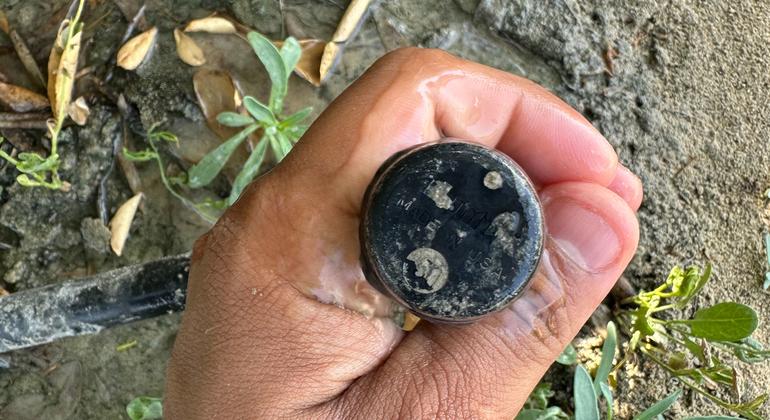Lemon scent memories drive innovation on Saudi farms

Mohamed Alnwairan stands in front of a bright green citrus tree that in four months will produce its first lemon harvest.
A former businessman turned farmer, he has been farming land in Al Ahsa, the eastern desert of Saudi Arabia, for the past 15 years. Now, due to climate change and dwindling water supplies, he is adopting new technology as well as a new crop.
“We are very proud of our lemons in this part of Saudi Arabia. You can feel the citrus oil on your hands when you touch them,” he said. UN News. “They remind us of our childhood and now I have the opportunity to grow them commercially.”
Mr. Alnwairan looks over his small farm located in an oasis near the city of Hofuf. It is about a thousand square meters, on sandy soil scattered with about 120 two-meter tall trees that have been growing for nearly four years.

A farm worker takes care of a lemon tree watered using smart technology.
Smart irrigation
“On my left are plants watered using advanced technology and on the right are plants I watered by hand using traditional methods,” he said. “Watered plants are growing stronger.”
The differences in color, shape and firmness are noticeable, and their robust health is largely due to how they are watered.
Mr. Alnwairan’s farm is piloting a smart irrigation system, a resource-saving farming method that is being promoted in this area by the Food and Agriculture Organization of the United Nations (FAO).
He uses an app on his smartphone to monitor the soil, monitor and provide the amount of water his lemon trees need to grow. When it rains, sensors record wet conditions and pause water supply on a scheduled basis. If plants aren’t getting enough water, the app can direct greater water flow, if needed, all remotely.

Mahmoud Abdelnabby is an agricultural extension specialist at FAO.
Water stress
Water was once abundant in the oasis’ farmland, but reduced rainfall due to climate change and the growing of thirsty rice, a local delicacy, have led to lower water tables, making access to water difficult. more difficult and more expensive.
Mr. Alnwairan had to stop growing rice on another plot of land nearby when the water in his well dropped 300 meters below ground.
“Smart irrigation can reduce water consumption by 70% and is more sustainable for the environment,” said Mahmoud Abdelnabby, FAO irrigation expert.
Farmers currently don’t have to pay for water, but automation brings other savings because fewer farm workers are needed to water crops, a time-consuming and arduous job during the intense heat of the growing season. farming in Saudi Arabia.
According to FAO’s Mr. Abdelnabby, although advanced technology is available on the local market and although financial investment is required, “it brings higher productivity and lower wage costs.”

Mohamed Alnwairan (centre) explains how his farm benefits from smart irrigation techniques.
Loss of land
As the climate continues to change across Saudi Arabia’s desert lands and droughts increase, farmers are also struggling with desertification and loss of productive land.
“Smart irrigation is part of an integrated response to climate change, which includes land management and plant selection”. not only use water but also help improve soil and prevent desertification.”
In December 2024, global leaders from governments, international organizations, the private sector and civil society came together in the Saudi Arabian capital Riyadh, under the auspices of the Convention United Nations to Combat Desertification (UNCCD) to discuss solutions to drought, land loss and land recovery.
Globally, up to 40% of the world’s land is degraded, with serious consequences for climate, biodiversity and people’s livelihoods.
Like farmers around the world, Mr. Alnwairan uses his years of experience and expertise to increase crop yields out of necessity and opportunity.
“I am considering applying a smart irrigation system across my farm to focus mainly on growing lime, for which I already have a ready market,” he said.
If other farmers follow his lead, water supplies will advance further in these arid lands while growing crops will help slow desertification.




